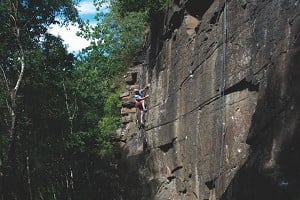
By its very nature, climbing could be seen to possess two opposing elements - yin and yang, perhaps. On the one hand, climbing is tranquility and calm - you're far away from the stresses and strains of the daily grind when outdoors in the fresh air and focused only on the next move.
On the other hand - the determination and strength of mind required when pushing hard, the pressure of over-ambitious goals and the stress of fighting fears - climbing can be a turbulent and frenzied affair. A mental battle, won or lost depending on which route our passion takes us down.
This is not the only dialectic in climbing - it has the capacity to be a social activity as much as a solitary one.
With such a diverse set of conflicting emotional experiences, climbing caters for a variety of individual preferences, combining physical and emotional exercise with the added bonus of an outdoor environment. Due to its mentally engaging nature, climbing seemed like a unique pursuit to focus on when considering the impact of physical activity on mental health.
Recent focus on removing the 'taboo' status of mental health issues in the media has brought illnesses such as depression, anxiety and other mood disorders into the spotlight. One in four people will experience some kind of mental illness over the course of a year. The collective term 'mental health issues' includes a diverse spectrum of conditions, from depression to autism, eating disorders and learning difficulties such as dyspraxia and dyslexia. Research has shown that outdoor exercise can reduce depression and anxiety, and nationwide campaigns have been set up to encourage participation in sport and exercise by mentally ill individuals.
In the climbing world, articles such as Rock&Ice's 'Suicide in Our Sights', blogs sharing personal experiences and the birth of Climb Out have all addressed the subject with an emphasis on the importance of the climbing community and the positive effects of climbing on mental health and wellbeing. In what was a major step in ending the awkward silence surrounding mental health, the British Mountaineering Council recently signed the Mental Health Charter for Sport and Recreation to help remove stigma and prejudice.
The aim of this article is to shed some light on the difficulties faced by individuals suffering from mental illness, by sharing the experiences of a variety of people of all ages, genders and of different occupations. The one thing they each have in common is a love for climbing and the outdoors - as well as a strong appreciation of the benefits it has reaped for their mental wellbeing.
"It can't be seen or quantified. There isn't a cast or a bandage. There isn't a timeline to get better. Not like a broken leg or a ruptured pulley." - Katy
Rebecca Williams, Consultant Clinical Psychologist

"For mild to moderate depression, exercise is as good as or better than anti-depressants. That's something that the GP probably won't tell you, they're more likely to give you a tablet."
Rebecca stressed the importance of social support and connection, which when coupled with being outdoors and in nature has been shown to reduce the effects of mental illness. An additional benefit is the small personal goals which climbing can offer us, which Rebecca calls "behavioural activation." She explains:
"Behavioural activation is an important factor - it's basically having small tasks to do, so you'd be incorporating exercise as one of your 'things to do' and setting small goals in a way that you might almost not realise – be it using climbing grades or running further, for example."
Despite the importance of community, the outdoors and goal-setting, I wondered whether Rebecca has come across any negative aspects of the sport which may in fact lead to mental health issues, or hinder the recovery from them.
"The downside for me is that climbing tends to attract people that are quite perfectionist. There is nothing wrong with perfectionism per say but it can get out of hand: it's useful in terms of training, achieving goals and being determined but it's a double-edged sword. Perfectionist people see things in a very black and white way which can be a risk factor for depression. If people are saying that they've either succeeded or failed, things are either right or wrong, or seeing things in absolute terms, then that way of thinking can be very unhelpful. It's about being aware of your personality and watching for when healthy perfectionism tips over into unhealthy perfectionism and you start beating yourself up."
So how do people overcome the setbacks of their perfectionism? Rebecca notes that psychologists are becoming more interested in mindfulness and compassion-based approaches:
"People who are perfectionist seem to find a lot of shame associated with perceived failure (when they're not really failures!) so a lot of the approaches now are centred around developing self-acceptance and trying to leave the shame side behind by being compassionate with yourself."
Certain elements in climbing don't lend themselves very well to compassion, Rebecca explains, such as the grading system and the small, often insular culture in which we feel like people are watching and comparing each other:
"If things aren't going so well then the fact that climbing is such a small world can turn that social support into something more negative. Of course, it's not real but rather a perception of what's going on around us and how we may be perceived."
"It's a bit chicken and egg: in some ways you need people to speak out and tell their stories which is really helpful...but people will only do that if they feel safe to do so."
Curious about the considerable disparity between the sexes when viewing statistics on mental illness - such as 'British men are three times as likely as British women to die by suicide' - I asked Rebecca what was causing this gender gap, and found that it has a lot to do with gender roles and help-seeking behaviour:
"It depends on whether you take the feminist theory perspective or not, but for me this has nothing to do with biology and everything to do with gender roles. Rates of mental illness are actually higher for women than men. The feminist perspective would say that this is due to inherent sexism in society, but it's also about reporting rates as well as the acceptability of help-seeking. Other research suggests men are maybe slightly more impulsive and less able to access social support, which is also reflected in rates of suicide as an impulsive act."
She adds: "But the Jury's out on this one at the moment!"
Next, I asked Rebecca about the link between climbing, the outdoors and mental health. In what ways can climbing as a discipline and our outdoor community help, and what is currently being done?
"I think that the BMC signing the Mental Health Charter is really good and you are getting more top climbers coming out talking about some of their issues which can only be of benefit. We still don't talk about anxiety in climbing that much - it's portrayed as something you can get over with falling practice, but we need to stop simplifying this issue. Understanding that there's a difference between people who are a just bit nervous and people who are very anxious, and creating a culture where people are accepted for who they are is important, by saying "Oh yeah I felt like that too and this is what I did to overcome it.""
Rebecca added:
"In some ways having people with mental health problems come along to climb can help as it's a very non-stigmatising approach. Going into a room alone with a therapist can be very hard."
"It could happen to any of us, there is not a distinction between 'them and us'"
I asked Rebecca about the portrayal of mental illness in the media - is there such a thing as bad publicity?
"It's new territory. What's really good is in sport generally we are hearing more but coverage in the media citing "nervous breakdowns" is not a helpful way of putting it and it's stigmatising. People end up with mental health issues for very understandable reasons, nobody intends to get ill, it's not a weakness of character but rather that certain things have happened and put too much pressure on you and your coping mechanisms are no longer functioning well. It could happen to any of us, there is not a distinction between 'them and us' as it can often come across in the media."
As a final point, Rebecca was also keen to highlight the prevalence of eating disorders in climbing. There tends to be a focus mainly on women climbers, but she asserted that it's a hidden issue in men as well.
"In climbing there has been a big emphasis on diets and losing weight and lots of unhealthy images, most of the cases we hear of are women but there are many more men than we imagine who are also affected."
Katy Forrester

What is your mental illness and how long have you suffered from it?
I have periods of depression and have had these since I was a teenager, so 15 years roughly. I can get very low mood which can stay with me for months at a time. The only way I can describe depression is to say it is like carrying a very heavy weight around with you every day. It makes you tired and interferes with every choice you make...if you can make them! I guess I'm lucky enough (!) to have suffered for long enough that I'm learning to cope when I do get sick.
"When I get very low I lose the ability to try. Being ambitious with climbing like I am I need to be able to try, so I have to not climb when I'm very sick."
How does it affect your daily life?
I lose the ability to laugh. Sleep a lot more and become incredibly self-critical. When I am at my very worst I can go completely and utterly mad and not be like myself. It is a frightening place for myself and the people around me.
I'm always surprised I can cope day to day, I make sure I go to work and the wall to see friends. The meaning of life is in the doing of life. If I keep doing stuff, eventually I will see the point of doing it all in the first place and this will help lift me a little.
Has climbing helped you overcome it in any way?
Yes and no. I read a fascinating book called sunbathing in the rain by Gwyneth Lewis. She is a poet from Wales and the book describes her struggle with depression. For her, her depression taught her to listen to her mind and body.
When I get very low I lose the ability to try. Being ambitious with climbing like I am I need to be able to try, so I have to not climb when I'm very sick. I'm into the outdoors rather than just being a climber, so I walk a lot. I had a period of quite serious depression last year so I bought a dog and walked each day.
Why do you think this is?
Being in nature helps ground you. Getting to feel like you are part of something bigger seems to improve my mood. I love being in the hills, watching as the season change. I've spent more time in the hills since owning my dog than ever before and my mood has never been more stable. I watch the light changing, feel the awful weather and wind on my face. I feel small and insignificant compared to the environment I am walking in and all this puts depression in its place. Plus I now have a friend, a shadow, who goes everywhere with me. There is more strength in my friend than I knew was ever possible, and this helps a lot too.
Is the climbing community a particularly close knit or accepting one, do you think?
Not sure. I'll see when this is published.
Why do you think mental health is such a taboo subject?
It can't be seen or quantified. There isn't a cast or a bandage. There isn't a timeline to get better. Not like a broken leg or a ruptured pulley.
People struggle to empathise with depression. It's a pain which is hard to imagine even if you have mental health problems of your own as it is so personal and unique. Plus depression is very scary to see. It can destroy people and the people around them are powerless to help at times. I think that people believe that they can rage against it and it won't happen to those around them. They think wrong.
Jake McManus
Jake is 42 and a self-employed electrician from Wigan. He has been climbing for two years and is the founder of Climb Out - a charity aiming to raise awareness of mental health issues and bring people affected by them together through the medium of climbing. Having suffered from mental health issues since childhood, Jake explained the progression of his symptoms and the ways in which climbing has boosted his self-esteem and helped him through social contact.
What is your mental illness and how long have you suffered from it?
I've suffered from bipolar disorder and severe depression since childhood. As I got older I upgraded to panic attacks, sleep deprivation and social anxiety. In the last 5 years I've started to suffer from delusions and hearing noises, you could say I'm honing my issues as I get older. In all seriousness any illness without the correct treatment will simply progress.
It's strange to try and 'label' my issues. At the moment it feels as though I'm speaking of another person but tomorrow I may be full on delusional.
"I'm never too sure if I actually have an illness, I don't feel any different to anyone else. It simply 'is what it is.'"
How does it affect your daily life?
This is a complicated question to answer and depends on any given day, month or even year for me. There is no consistency which is really frustrating. I can be obsessive, impulsive, impatient and restless . My brain runs at 1,000MPH and formulates grand plans which seem perfectly rational at the time, as a consequence I've ended up in some strange situations.
Then there's the flipside where I over eat, I over sleep, I can't talk to strangers, I don't want to talk to friends, I have zero confidence and less than zero self worth. This leads to anxiety, stress, isolation, sleep deprivation and ultimately mainfests in delusions and hearing noises. Life is complicated in these times and being part of society is a challenge, I've recently had 5 months off work as I simply couldn't get going shall we say. Over the last year I've realised I'm often easily fatigued, I had this once when I was 16 and I hardly left the house. I did however grow really cool long hair, there's always a positive if we look hard enough.
Many of my daily issues would seem trivial to many people...I can struggle with simple tasks such as answering the phone, or going to a shop where I may see people I know, opening letters is a killer. I've spent days in bed trying to force myself out of it, I don't know why this is, I suppose I'm scared of the unknown.
Has climbing helped you overcome it in any way?
I get asked this question a lot and I still haven't found a definitive answer...for me climbing is a mental game and has many parallels with Mental Health issues.
"I always say that climbing isn't a miracle cure - it comes with its own stresses and strains such as fear, anxiety, or self doubt but this also puts people on an even keel. When you push your limits anyone can experience these feelings and this is where I feel climbing is unique."
I can't go for a bike ride with Bradley Wiggins or go for a run with Mo Farah while both of us push our limits I would be left for dead. I can however nip to Millstone while my mate tackles London Wall and I struggle to even top rope Dexterity. I did exactly this last year with a friend - I was proud to belay Henry and didn't drop him when he took a decent whipper, I became part of that climb, it was a team effort, how many sports can boast that? It empowers us, we become part of the action.
One aspect is that if you try hard you gain recognition, I'm a useless climber but I tend to give it my all and again climbing can be unique in the positivity and praise you get just from trying hard. If I kick a football and miss the goal by three metres I'm more likely to get my head kicked in than a pat on the back.
Another strong factor for me is that in climbing failure is progression, we fail, we learn and we try again. If you want a route badly enough, you will train or climb more, you may change your diet. It brings focus, goals, and more importantly we generally surpass original expectations.
"The physical benefits are obvious but mentally our achievements translate into our daily lives; personally climbing gives me a tangible positive process to recall."
My brain uses a trigger which says "don't give up, remember that route you thought you couldn't do." There are also many subconscious benefits, many people with Mental Health issues are habitual thinkers and a little positive rewiring can go a long way.
Climbing has helped transform my life in too many ways to mention but we must not forget that all the positive processes can also enhance negativity if we don't climb. The last time I climbed a few routes was in in November and before that I didn't climb for over 5 months. I haven't been out because of work, Climb Out and MH issues.
Is the climbing community a particularly close knit or accepting one, do you think?
This is the $60 million question!
I do know that if I choose to quit climbing I will have gained some great friendships across the UK and abroad. I would still drive for hours or catch a plane to see friends. I wouldn't mind belaying and would probably try the odd route .... who am I kidding? I'm not going to quit, but this is the key...my friends would still be there either way.
"Most of the people I have met through climbing are non judgemental and will climb with anyone regardless of age, sex, fitness, social background or disability."
Our lifestyle brings us together and climbers are from a diverse cross section of society who wouldn't usually meet in social circles. Being accepted by any part of society is of huge importance to people who have MH issues, it's one of the main instigators of isolation and depression. We can spot a climber anywhere in the world and have a conversation about limestone, granite or grit. The chances are that after a short chat you either have the same friends in your circles or have climbed at the same crag.
I also have a theory that a large proportion of climbers deal with the same issues as myself. Climbing is a huge mental game and even people who don't suffer from MH issues can relate to fear, anxiety and self judgement.
"I think the basic principles and lifestyle involved with climbing dictates the people who are steered towards it. There's a common need for a mental or physical battle, an escape from the rat race and a desire to do something different from the norm."
I initially found it hard to believe that no one had realised that climbing and MH are inherently linked and the emails and messages I often receive are proof of this. I'm proud of the people who say Climb Out helps them, I'm proud of their strength to get in touch or write a blog or even simply send me a small Facebook message.
Climb Out was never about me, I'm nothing special, I haven't achieved anything (unless eating pies can be counted) that's why I took the photos of me climbing off the main banner and replaced it with supporters. It's about a community who use climbing and the outdoors to help with our positive wellbeing, that's why it works so well.
Why do you think mental health is such a taboo subject?
Recently I've started to wonder if it is such a taboo subject. Maybe this is self enforced and media driven in many ways. For a start I don't believe the 1 in 4 is a true reflection of society - it's a nice advertising slogan and gives us the fulfilling impression of helping a minority but is but is it realistic? I would argue that 100% of us have either suffered of been in close contact with someone who suffers but it isn't like counting people who have blue eyes is it?
I've recently started to realise that in our silence many of us uphold and possibly accidentally created this taboo...in fact I am probably more guilty than most. This may come as a shock but I don't speak of MH issues at the crag or at work, I don't wave a banner staking claims of delusions or depression, I don't even speak to my wife about it. Sometimes I worry about people being judgemental, I worry that people will think I'm a loser, a liar or an attention craving lunatic and the list goes on. Pretty ironic that the guy who started a website about mental health and opening up doesn't really speak about it in his everyday life, eh?
Last year while reading Jamie Andrew's book "Life And limb" I found myself constantly comparing my problems to those who have physical disabilities and felt guilty for even contemplating the thought. Then towards the end of the book Jamie contemplates the same issues, this was a revelation for me. Jamie writes of his good friend Geoff who was delusional and psychotic but didn't receive the same support.
It was brave of Geoff to allow this to be printed and it was obviously important for Jamie to have this feature in his book and actions like these are a huge leap forward in terms of acceptability and normalisation.
How can we solve this problem?
Individually we all need to be more honest with ourselves and with others, because MH is a hidden disability communication is the key. We also need to surround ourselves with positive, supportive people and this isn't exclusive to anyone who suffers because we are all susceptible at any given time.
Talk to each other or write a blog... if you've just onsighted a scary trad route by the skin of your teeth I'm sure you want the whole world to know. If you've managed to bag that route while suffering from severe depression tell people about it, I guarantee you will get as much if not more respect.
All of us need to open up more...especially men, who tend to suffer in silence until it hits suicidal stages. Not only could many of these men help themselves but its an unfortunate fact that we live in a predominately male driven society. There are lots of influential and powerful men in everyday life and the media who could really help facilitate a change by simply speaking up.
The outdoor world are far behind many sports in accepting MH issues, cricket has a page with blogs and videos, the football association has lots of info on their web pages, rugby league has a whole site devoted to mental health!
As I said before counting people with MH issues is not like counting people with physical disabilities, maybe there are more of us than we think...maybe I am not really part of a minority...now there's a thought.
What is Climb Out?
Climb Out is essentially a community of mainly (but not solely) climbers which supports and promotes positive wellbeing through the website, blogs and social media on a global scale. A new multi functional website is in the process and there are plans to provide a service to help people get outdoors and to help with much needed research. I understand that many people don't come forward to talk about mental health issues but the site has seen over 25,000 views in 2015 - so that says a lot!
Bethan Thomas
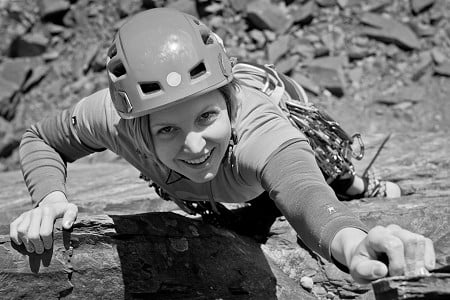
What mental health problems have you suffered from and for how long?
I suffered with Bulimia for around 10 years during adolescence and early adulthood. I am 5 years into recovery although I am still affected by low mood and social anxiety which I believe is interrelated.
How do they affect your daily life?
During dips in my mood I find it hard to feel positive about any aspect of my life. I have very low self- worth and wake up feeling hopeless and often fearful. Although I know the feeling usually passes in about a week I find it hard to believe I will ever feel better. I do not like to socialise and become very anxious if I have agreed to go out with friends and try to find ways of cancelling. I lose concentration and then become frustrated with myself that I have not performed to a high standard. These thoughts and feelings happen every 3-6 weeks and I can tell they are coming on as I usually have triggers such as racing thoughts and a period of heightened mood beforehand.
"The focus in climbing is also an excellent way to train your mind to slow down and take note of the little things and be proud of yourself."
Has climbing helped you overcome them in any way?
I believe climbing was central to my recovery from an eating disorder and helps me currently maintain good mental health. It helped me rethink and relearn how being strong and confident meant looking after yourself and not denying your body of vital nutrition and care. Feeling strong and achieving in climbing has helped build my self-esteem. Climbing goals provided me with a connection to a meaningful project, something that is tangible and achievable. I have also benefitted from being able to learn to control my fear and this is something I am learning to overcome through climbing. I love how the climbing community is so open to these issues and I have a network of climbing partners whom I have no problem telling how shocking I am feeling, and knowing that there will be no judgement. The focus in climbing empowers you and is also an excellent way to train your mind to slow down and take note of the little things and be proud of yourself.
Is the climbing community a particularly close knit or accepting one, do you think?
Accepting! Obviously you come across people in every walk of life who you feel should be more open minded or who have their own cliches but on the whole I think climbers are a great bunch and make people feel welcomed.
Why do you think mental health is such a taboo subject generally?
People might think it is a weakness and most people like to present as strong. The media has not helped with framing those with mental health problems as "nutters" or "crazy" and has created an "us and them" culture. 1 in 4 of us will suffer from mental health difficulties in our lives. That's a bigger percentage than those with hayfever! Mental health is just as important as physical health. No one is worried about speaking about having the flu.
And from your professional perspective...
What are the most common mental illnesses faced in today's society?
Anxiety and depression are the most common forms of poor mental health in the UK.
"Suicide is the biggest killer of men under 50. This may be down to men not feeling they can discuss their problems as freely as women due to people viewing this as a weakness or a "feminine" issue."
There has been particular emphasis on men's mental health of late - with British men being three times more likely to commit suicide than women. Why is there this disparity between the sexes?
Suicide is the biggest killer of men under 50. This may be down to men not feeling they can discuss their problems as freely as women due to people viewing this as a weakness or a "feminine" issue. It may also be down to men traditionally being the breadwinner and feeling like the have to plough on regardless. This of course is changing. The huge numbers of male suicides is a cultural problem that we are all responsible for. Men might get teased for opening up and even if this is banter it can put someone off seeking help.
What do you think is the key to raising awareness of mental health issues?
I really think talking about it more openly is a good starting point. And also more positively. I believe a lot of my strengths have come out of coping with mental health difficulties and these should also be acknowledged and celebrated. We should all be less bothered about coming across as "weak" or people not taking mental health problems as seriously as physical. This is obviously easier said than done, it's a joint effort.
Hannah Wilson

"I don't blame stopping climbing for my depression. There is no cause of depression, but I think my injury was a trigger and I did not know how to handle it."
What is your mental illness and how long have you suffered from it?
My mental illness is depression and I would say I have suffered from it for the past three years. Depression is one of the strangest and most difficult things I have ever encountered in my entire life. Depression is not just feeling sad or down for a couple of weeks, it is when you cannot function, it takes hold of your whole mind and affects every aspect of your life. I have always been a very confident and outgoing person, and still am with depression, and I found that I would be fine when with friends, feel on top of the world. But I could not be by myself, it would make me feel beyond lonely and I felt as though I was insane. I first got diagnosed with depression during my first year of college after leaving school and college was a very bad place for me, I was expected to study for three A levels which for any person without a mental illness would be manageable.
Has climbing helped you overcome your illness in any way?
I started climbing when I was eleven, primarily bouldering. I got very strong very quickly and started competing a lot. I went through puberty while climbing and that was a really hard period of time. Climbing with my dad meant he didn't really understand things when I was having a bad climbing day. But I pushed on and when I was seventeen I won the Junior British Bouldering Championships in my age category, and came second overall. I can honestly say this was the happiest day of my life, I had never dreamed I could accomplish something so big. During this time I had already suffered with depression for around a year, but did not realise it at the time. During that year leading up to the JBBC's I had to train hard, work hard at school, and I managed and I succeeded very well. For me, climbing is a way to express yourself, if you feel angry then jump on that burly powerful problem and scream your way up. After every session I had I felt satisfied - the physical act of hauling yourself up something ridiculous was really rewarding, and addictive.
I think this is why during that first year when I started feeling depressed, I didn't really notice it. I just thought I was being a normal stroppy teenager. But the climbing helped me, it was a release. After the JBBC's and my big success, I started to calm down a bit, have a rest period. Starting enjoying being a teenager. Then I competed in the CWIF in 2013. I was on track to make semi finals like I had the year before, and I bust my knee on one of the qualifying problems. I was heartbroken, thinking the worst and I couldn't finish competing. Absolutely devastated.
For me this was a problem because I am super competitive, mostly with myself. And so this is when I stopped climbing as much, stopped seeing my climber friends and my depression began worsening. I do not blame stopping climbing for my depression. There is no cause of depression, but I think my injury was a trigger and I did not know how to handle it. And unfortunately it has left me with no climbing in almost three years up to now. It makes me angry and upset because I was going somewhere, and now all those opportunities are gone. Climbing was definitely a factor in my depression, and I personally think my life would have been very different in the past few years if I had continued to climb.
Is the climbing community a particularly close knit or accepting one, do you think?
The climbing community is one like I have never known before. You will meet anyone and everyone and most probably will be everyone's best mate. Everyone is so accepting and close knit. You honestly feel like you have a second family. There is always somebody to help you out.
If I had stayed within the climbing community then maybe I wouldn't have spent a month wanting to kill myself. Maybe I could have been competing in World Cups by now. But I don't dwell on these thoughts anymore because I am still young, and I've still got plenty of time to accomplish my dreams.
"You wouldn't just ignore your leg if it was falling off. So if your mind isn't working right, get it checked out."
Why do you think mental health is such a taboo subject?
When I came home from the doctors and told my mum I was depressed she didn't believe me, and continued to not believe me for two years. I think people are like this because they are not educated, who are in the schools telling the children about depression and anxiety and every other mental illness? No one. The one question that angers me the most, 'why cant you just cheer up? Stop being so miserable.' Depression affects your brain, the computer of your body. If you were speaking to a diabetic, would you simply tell them to produce their own insulin and manage their own blood sugar levels? No. They have treatment because it is a recognized condition. So let's apply this to depression. Instead of labeling someone as 'attention-seeking' or 'insane' or just plain 'mardy', why don't we recognize that this person is not well, they are in danger of hurting themselves and they need someone to help them? Through a few years of battling I came out on top. But this isn't the case for everyone, every year we hear of more and more teenagers committing suicide, not to mention the rest of the population.
If you are out there and you feel as though you are struggling, or you already know you have a mental illness, then catch it early. Don't let anyone put you down about it. Take it seriously. You wouldn't just ignore your leg if it was falling off. So if your mind isn't working right, get it checked out.
Stefan Gillot

What is your mental illness and how long have you suffered from it? How does it affect your daily life?
I have depression and anxiety issues that are a secondary effect from a physical condition I have called Central Sensitisation but the generic term is also simply Chronic Pain. I developed the pain after an operation four years ago this summer. This changed my life forever. I used to be a fitness fanatic swimming, cycling and running regularly and then lost it all. For the first three months I was bed bound, six months housebound and slowly increased my mobility.
I was under investigation for a year and was being told that pain just happens and there is nothing I can do and it will be life long. Being in excruciating pain 24/7 and hearing this, falling through the benefit system and loosing all my savings I inevitably broke and entered a deep depression.
After managing to learn how to be as 'normal' as possible through a pain management program I just yearned for the feeling of physical activity. Two friends asked me to try climbing and I first of all dismissed the idea as I knew it would never work but finally I went to the local bouldering wall and before I knew it I was on an introduction to outdoor climbing course.
This was an amazing thing, I couldn't ride a bike or run but for some reason I could climb and I took the bull by the horns and a very special group of friends who I am eternally grateful took me under their wing and took me to some of Yorkshire's best gritstone and helped me climb. I have said thank you to them but I am sure they still don't appreciate what they have done for me.
Trying not to get too deep and meaningful; I have been having long term counselling though my university and before I started climbing I was asked in a very counselling style 'what do you see?'. I closed my eyes and saw myself sitting down looking over a landscape crying but also peaceful. Not too long after I finished a climb and turned around to a landscape similar to what I thought about with my councillor.
After climbing for a while I started to feel happiness and certain emotions that I had not felt since before the operation and my life has been making many improvements but depression does not have a quick fix and I am still working on my mental health.
"Before suffering from it I did not understand depression. I was the type of guy who made typical comments like 'just cheer up, get on with it, think yourself happy'."
Is the climbing community a particularly close knit or accepting one, do you think?
Very! If I had not had the first group of climbers taking me out and teaching me from not knowing me very long, I would never have broken into the deep depression I was having and started improving. I have met so many new friends down the climbing wall and getting involved in climbing trips etc. I have a lot of anxiety with groups as I feel my physical condition holds me back and limits my climbing. Climbing is a physical sport and there is still the wanting to push limits. I sometimes feel like a burden and I've been told it's not true but that's the negative thoughts that I continually need to battle.
Why do you think mental health is such a taboo subject? How can we solve this problem?
I think there are a lot of issues with men and depression as there is stigma about being weak. I felt like a failure as a man when I was unable to cope with the pain. I couldn't work and had no control over my life. I was a slave to the pain. Crying is not acceptable but sometimes that was the only way I could feel better but I had to hold it in till I was alone...but crying along is not helpful either. There are a lot of negative feedbacks that trap people into depressive cycles.
Before suffering from it I did not understand depression. I was the type of guy who said they typical comments like 'just cheer up, get on with it, think yourself happy.' I was able to think myself happy and didn't understand why others couldn't. Until I suffered from it. I think there is a misunderstanding of mental health conditions as when one is reported, the only way to communicate it is to simplify it, but this can create misunderstandings.
I managed to change my struggle into a positive direction with lots of help from people around me and the ability to talk about my issues. Admitting I have a problem and talking to professionals helped but having a group of friends around that understood my problem and helped me get out climbing also helped. Ultimately, I think allowing people to be open and being able to get help without being judged is very important.
Where to get help?
- Contact your GP
- Check out Glasgow STEPS self help advice
- Look at the BACP (British Association for Counselling and Psychotherapy) website to find a registered counsellor
- Watch Connecting with People's You Can Cope video regarding suicide
Read a UKC Article by Ailsa Graham on Climbing with Asperger's.
Watch a video below of climber Margo Talbot's TED Talk about climbing out of depression:
- SKILLS: Top Tips for Learning to Sport Climb Outdoors 22 Apr
- INTERVIEW: Albert Ok - The Speed Climbing Coach with a Global Athlete Team 17 Apr
- SKILLS: Top 10 Tips for Making the Move from Indoor to Outdoor Bouldering 24 Jan
- ARTICLE: International Mountain Day 2023 - Mountains & Climate Science at COP28 11 Dec, 2023
- ARTICLE: Did Downclimbing Apes help Evolve our Ultra-Mobile Human Arms? 5 Dec, 2023
- ARTICLE: Dàna - Scotland's Wild Places: Scottish Climbing on the BBC 10 Nov, 2023
- INTERVIEW: Loki's Mischief: Leo Houlding on his Return to Mount Asgard 23 Oct, 2023
- INTERVIEW: BMC CEO Paul Davies on GB Climbing 24 Aug, 2023
- ARTICLE: Paris 2024 Olympic Games: Sport Climbing Qualification and Scoring Explainer 26 Jul, 2023
- INTERVIEW: Malcolm Bass on Life after Stroke 8 Jun, 2023



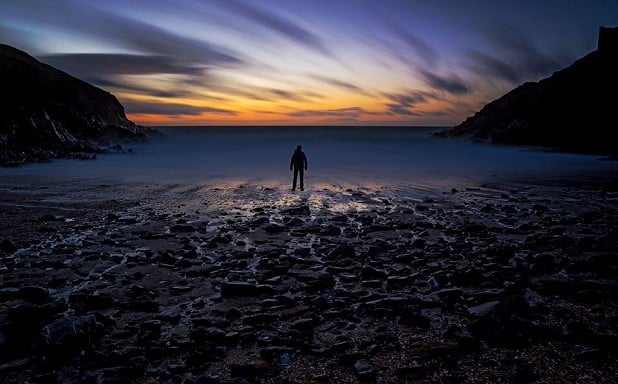
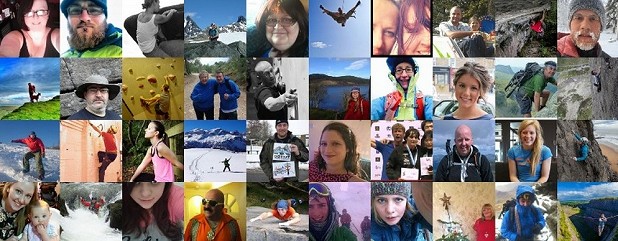

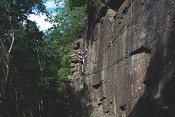
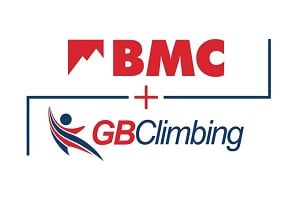











Comments